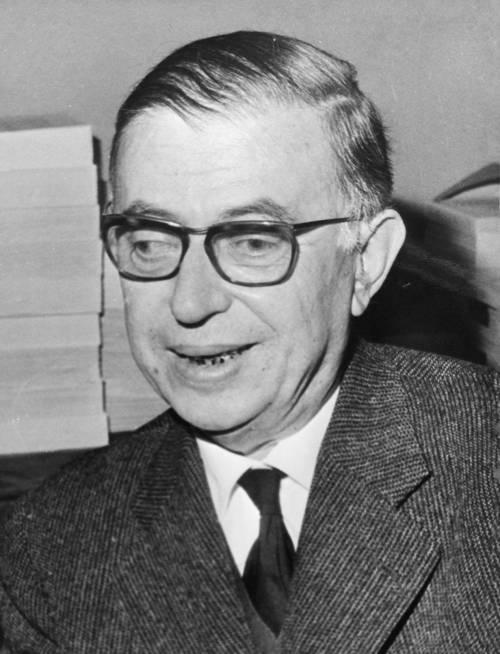
FAQ About Jean-Paul Sartre

Who was Jean-Paul Sartre?
Jean-Paul Sartre was a French existentialist philosopher, playwright, novelist, and political activist. He was one of the key figures in the philosophy of existentialism and phenomenology and had a lasting influence on various fields, including philosophy, literature, and politics during the 20th century. Sartre is well known for his works such as Being and Nothingness and No Exit.

What is Jean-Paul Sartre's main contribution to philosophy?
Jean-Paul Sartre's main contribution to philosophy is his development of existentialism. This philosophy emphasizes individual freedom, choice, and responsibility. Sartre argued that humans are condemned to be free, meaning that even though we did not choose to exist, we must always make choices, and we are responsible for the consequences of these choices. His work Being and Nothingness is a seminal text in existentialist thought.

When did Jean-Paul Sartre live?
Jean-Paul Sartre was born on June 21, 1905, and died on April 15, 1980. His life spanned most of the 20th century, and he actively contributed to philosophical discourse, literature, and political activism during his lifetime.

What are some of Jean-Paul Sartre's most famous works?
Some of Jean-Paul Sartre's most famous works include the philosophical treatise Being and Nothingness, the play No Exit, and the novel Nausea. These works collectively explore themes related to existentialism, freedom, and the human condition.

Did Jean-Paul Sartre win a Nobel Prize?
Yes, Jean-Paul Sartre was awarded the Nobel Prize in Literature in 1964. However, he famously declined the award, stating that he had consistently declined official honors and did not want to be institutionalized as a writer.

Why did Jean-Paul Sartre decline the Nobel Prize for Literature?
Jean-Paul Sartre declined the Nobel Prize for Literature because he believed that a writer should not allow himself to be turned into an institution. He had consistently declined other official honors and saw his work as an expression of his personal freedom.

What did Jean-Paul Sartre mean by 'existence precedes essence'?
The phrase 'existence precedes essence' is a key tenet of Sartre's existentialism. It means that humans first exist, and through their actions and choices, they define their essence or nature. Unlike inanimate objects, which have a predetermined purpose, humans are free to create their own meaning and identity.

How did Jean-Paul Sartre influence existentialism?
Jean-Paul Sartre greatly influenced existentialism by articulating the philosophy that emphasizes individual freedom, choice, and responsibility. His works such as Being and Nothingness provide a comprehensive exploration of existential themes, examining how freedom shapes human existence and how people create meaning in a world without inherent purpose.

What is 'Being and Nothingness' about?
Being and Nothingness is a philosophical treatise by Jean-Paul Sartre that explores existentialism through the concepts of being, consciousness, freedom, and the nature of reality. It delves into how individuals must confront issues of freedom and nothingness, making choices that define their existence and identity.

What themes does the play 'No Exit' explore?
The play No Exit by Jean-Paul Sartre explores themes of existentialism, including freedom, choice, and self-deception. It famously asserts that 'Hell is other people,' highlighting the idea that interpersonal relationships can be a source of existential anguish and reflection.

Was Jean-Paul Sartre involved in political activism?
Yes, Jean-Paul Sartre was heavily involved in political activism. He was an outspoken social and political critic, advocating for Marxism and participating in various causes, such as opposing colonialism, the Vietnam War, and supporting human rights movements. He used his public influence to voice opinions on political and social issues of his time.

What was Jean-Paul Sartre's relationship with Simone de Beauvoir?
Jean-Paul Sartre and Simone de Beauvoir had a lifelong partnership, both romantic and intellectual. They shared a strong personal bond and collaborated on many philosophical and literary projects. Both were influential figures in the existentialist movement and had a significant impact on each other's work.

How did Simone de Beauvoir influence Sartre's work?
Simone de Beauvoir was a significant influence on Sartre's work, particularly through her own pioneering feminist and existentialist ideas. Their relationship was marked by deep intellectual collaboration and mutual inspiration, shaping much of Sartre's understanding of existential themes, gender issues, and human freedom.

What role did Sartre play in French intellectual life during the 20th century?
Jean-Paul Sartre played a crucial role in French intellectual life during the 20th century by being one of the most prominent public intellectuals. His writings and political activism exerted a significant influence over philosophical, literary, and political discussions, establishing him as a leading figure in existentialism and leftist thought.

What was Sartre's view on human freedom?
Sartre viewed human freedom as an essential and defining feature of human existence. He argued that people are 'condemned to be free,' meaning they have no choice but to continuously make decisions that define their lives. For Sartre, freedom comes with a responsibility for one's actions, leading to an authentic existence.

How did Sartre's philosophy address the concept of responsibility?
Sartre's philosophy addressed the concept of responsibility by emphasizing that with freedom comes the necessity of responsibility for one's actions. Existentialism argues that individuals must accept the burdens of their choices and the resultant responsibilities, living authentically by acknowledging their role in shaping their own and others’ reality.

What is the significance of Sartre's concept of 'bad faith'?
Sartre's concept of 'bad faith' involves the self-deception of individuals who deny their inherent freedom to escape the anxiety it brings. It refers to the act of lying to oneself to avoid facing the responsibility of making authentic choices. Becoming aware of and overcoming bad faith is essential for achieving authenticity in Sartre's existentialist framework.

How did Sartre's philosophical ideas influence literature?
Sartre's philosophical ideas influenced literature by introducing existential themes such as freedom, absurdity, and the search for meaning into his novels and plays. His writings often demonstrate existentialist ideas and serve as practical explorations of his philosophical concepts, influencing both his contemporaries and later literary movements.

What was Jean-Paul Sartre's influence on modern philosophy?
Jean-Paul Sartre's influence on modern philosophy is significant in that he popularized existentialism and expanded its discourse into various disciplines, including literature, psychology, and political theory. His works inspired generations of thinkers to consider the implications of human freedom and responsibility in a seemingly indifferent universe.
